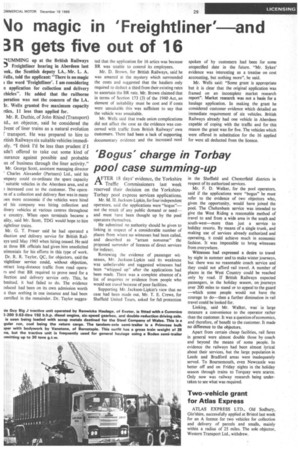'Bogus' charge in Torbay pool case summing-up
Page 31

If you've noticed an error in this article please click here to report it so we can fix it.
ACTER 18 days' evidence, the Yorkshire Traffic Commissioners last week reserved their decision on the YorkshireTorbay pool express services applications.
Mr. M. 11. Jackson-Lipkin, for four independent operators, said the applications were "bogus"— not the result of any public demand or need— and must have been thought up by the pool operators themselves.
He submitted no authority should he given to linking in respect of a considerable number of places from where no witnesses had been called, and described as "arrant nonsense" the proposed surrender of licences of direct services for indirect.
Reviewing the evidence of passenger witnesses, Mr. Jackson-Lipkin said its weakness was unbelievable and suggested witnesses had been "whipped up" after the applications had been made. There was a complete absence of a list of enquiries or evidence from people who would not travel because of poor facilities.
Supporting Mr. Jackson-Lipkin's view that no case had been made out, Mr. T. E. Crewe, for Sheffield United Tours, asked for full protection in the Sheffield and Chesterfield districts in respect of its authorized services.
Mr. F. D. Walker, for the pool operators. said if the applications were "bogus" he must refer to the evidence of two objectors who, given the opportunity, would have joined the pool. The Cheltenham service was intended to give the West Riding a reasonable method of travel to and from a wide area in the south and south-west—more than just a service to holiday resorts. By means of a single trunk, and making use of services already authorized and operating, it could achieve much in economic fashion. It was impossible to bring witnesses from everywhere.
Witnesses had expressed a desire to travel by night in summer and to make winter journeys, but there was no reasonable coach service and they could not afford rail travel. A number of places in the West Country could be reached only by road. If British Railways expected passengers, in the holiday season, on journeys over 200 miles to stand or to appeal to the guard —which some people would not have the courage to do—then a further diminution in rail travel could be looked for.
Linking, said Mr. Walker, was in large measure a convenience to the operator rather than the customer, It was a question of economics, and therefore, of benefit to the customer. It made no difference to the objectors.
Apart from certain cheap facilities, rail fares in general were almost double those by coach and beyond the means of some people. In evidence the railways had been almost lyrical about their services, but the large population in Leeds and Bradford areas were inadequately served. To Bournemouth, even Newcastle was better off and on Friday nights in the holiday season through trains to Torquay were scarce. Only now was railway research being undertaken to see what was required.




























































































































